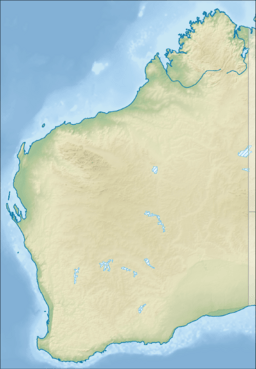Angove Lake facts for kids
Quick facts for kids Angove Lake |
|
|---|---|
| Location | Great Southern, Western Australia |
| Coordinates | 34°56′32″S 118°09′54″E / 34.94222°S 118.16500°E |
| Type | Freshwater |
| Primary inflows | Angove River |
| Primary outflows | Gardner Creek |
| Catchment area | 29 square kilometres (11 sq mi) |
| Basin countries | Australia |
| Designation | Two Peoples Bay Nature Reserve |
| Max. length | 900 metres (2,953 ft) |
| Max. width | 400 metres (1,312 ft) |
| Surface area | 33 hectares (82 acres) |
Angove Lake is a permanent freshwater lake in the Great Southern region of Western Australia. It is a natural lake, meaning it formed without human help.
Contents
About the Lake
Angove Lake is part of a group of three lakes called the Moates Lake System. The other two lakes are Moates Lake and Lake Gardner.
How the Lakes Formed
About 120,000 years ago, the Earth was warmer. During this time, these lakes were connected. They formed a large area where fresh river water mixed with salty ocean water. This type of area is called an estuary.
Size and Water Use
The main part of Angove Lake covers about 40 hectares. That's like 100 football fields! But if you include the wet areas around it, the total area is closer to 100 hectares.
A 3-kilometer channel was built south of the lake. This channel helps drain water into Gardner Creek. The water in Angove Lake is very fresh and clear. It has very little tannin, which can make water look brown. Water from the river that feeds the lake is also pumped to Albany. It helps supply drinking water for the town.
Nature Around the Lake
The area around Angove Lake is mostly untouched by humans. This means the rivers and the lake itself are in a very natural state.
Plants and Animals
The lake is mostly a large swamp filled with sedges. Sedge is a type of grass-like plant. You can see tall stands of Baumea articulata plants. Around the edges of the lake, there is a forest of paperbark trees and Agonis plants.
Important Bird Area
Angove Lake is part of a special place called the Two Peoples Bay and Mount Manypeaks Important Bird Area. BirdLife International has named it this because it's very important for protecting rare and endangered birds. Many different bird species live here.
Spotted Galaxias Fish
A very rare fish called the Spotted Galaxias (Galaxias truttaceus hesperius) lives in this area. It is critically endangered, meaning it's at high risk of disappearing forever. This fish is only found in the Angove River, Angove Lake, and the Goodga River.


